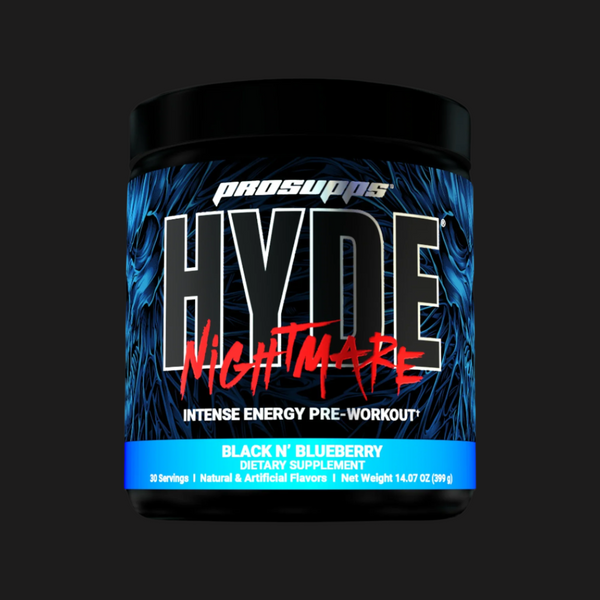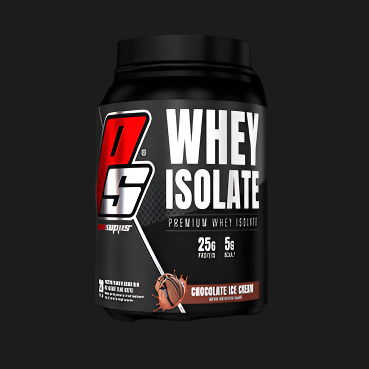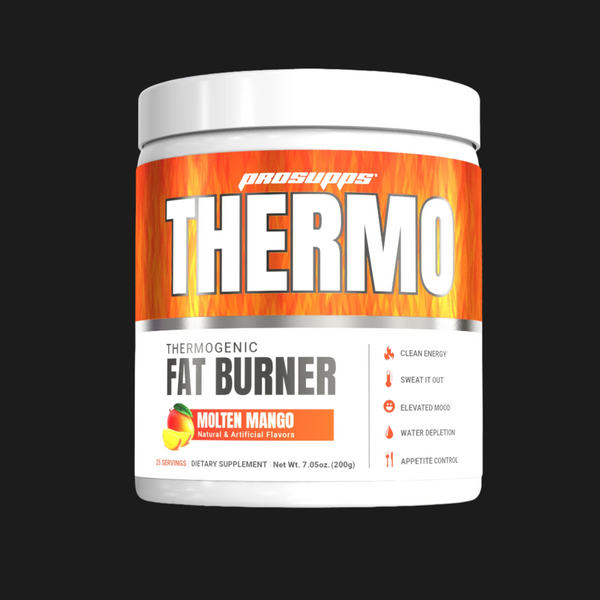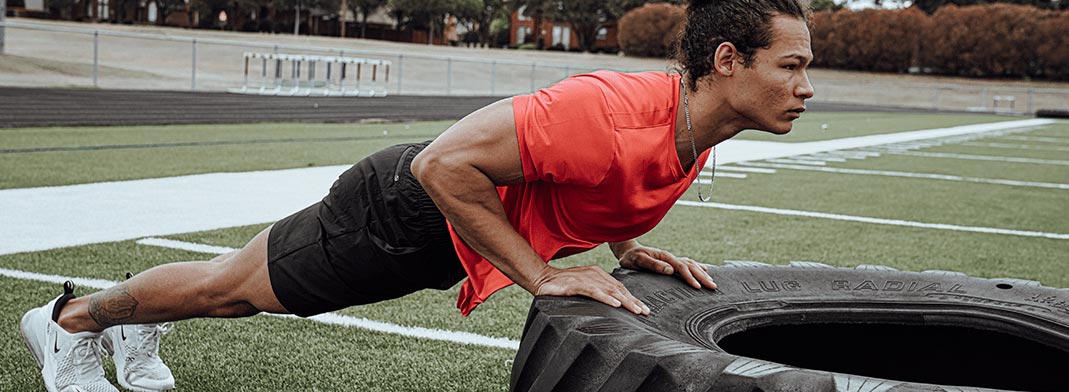
How to Have an Effective Workout: 4 Pre-Workout Blunders to Avoid
 Written by Guy Gustafson
Written by Guy Gustafson April 29, 2021
Have you ever suffered a muscle strain after a workout because you didn’t warm up properly beforehand? Or perhaps you were gulping down your pre-workout supplement just as you walked into the gym?
Many people overlook the importance of a good pre-workout regime, turning up unprepared and often unfocused.
If we take a second to observe the practices of professional athletes, we soon realize how essential their pre-workout routine is to them.
We have all seen it, the robotic rituals many of the track athletes have before they start their race. Even in a stadium full of thousands of spectators, they maintain their focus and keep their eyes set on the prize.
Now imagine if you could get in the zone just like an Olympic athlete every single time you show up at the gym. That’s what an effective pre-workout routine can give you. Like a ritual, each step is pre-determined and well-defined, so there is little margin for error.
Of course, we might not bring home the gold every time you hit the gym. But to really be effective with your workout sessions, you need to have an effective pre-workout routine that will help you get into the right headspace to maximize your time and effort.
Here are a few things you should avoid in order to have an effective workout.
Pre-Workout Blunder #1: Poor Time Management
Be honest: How many times have you strolled into the gym with a pre-workout beverage in hand? Or worse, you’re a faux bartender mixing your pre-workout concoction in the locker room. If you’re guilty of poor pre-workout time management, it's time to change your habits.
The ingredients in a pre-workout blend can require between 15 and 60 minutes to fully attain peak concentration and flow within your bloodstream.
Therefore, if you chug your pre-workout mix right before your workout, chances are, you won’t feel any of the desired effects. You’re short-changing yourself by not allowing your body time to properly benefit from the nutritional supplements.
As you know, pre-workout supplements come in a variety of mixes — with each blend serving a specific function. For instance, supplements with stimulants, like caffeine, act as energy boosters to give you the push you need to step up your workout. What's the point of taking a pre-workout supplement with caffeine if the boost doesn't hit until after you've finished your workout?
Other supplements, such as those containing branched-chain amino acids (BCAAs) or creatine monohydrates, are more effective for building muscle mass. BCAAs possess damage-inhibiting properties that protect muscle fibers from excessive wear and tear. Similarly, creatine monohydrate helps build and sustain existing muscle mass. Together, BCAAs and creatine encourage muscle mass growth and need to be taken at the right time before your workout in order to be effective.
While every pre-workout blend fulfills a different purpose, the common denominator is that they’re all labelled as pre-workouts. Hence, they’re meant to be consumed at a reasonable time before exercising in order for their full effects to take place.
Pre-Workout Blunder #2: Skipping Your Warmup
You can never go wrong with a good warmup before exercising. A good warmup typically entails stretches and light cardio to get your blood pumping. As the name suggests, this movement is meant to “warm up” your otherwise “cold and tense” body. Yet, despite all the positives attributed to warmups, many people skip them due to laziness or time constraints.
However, keep in mind that skipping your warmup significantly increases your chance of injury.
Warming up helps dilate your blood vessels to facilitate a higher rate of blood flow throughout the body, priming your muscles for the intensive physical strain ahead. A stronger blood flow also increases the temperature of your body for optimal flexibility and movement efficacy. Lastly, warming up helps to increase your heart rate at a steady pace, preventing any unnecessary stress from a rapid heart rate increase. Thus, if you fail to properly warm up, you put your body at higher risk of otherwise avoidable injuries.
You can take your warmup one step further and tailor it to the specific type of exercise you’ll be doing. For example, weightlifting involves a lot of repetitive motions of particular muscle groups. Therefore, stretching those muscle areas during your warmup makes more sense than focusing purely on cardio. Additionally, those stretches also help to adjust your form and pinpoint any tender or taut areas that might require extra attention. Conversely, for running, more dynamic stretches involving the hamstring and calves would be sensible in order to acclimatize your body to a fuller range of movements.
Just a five minute warmup could prevent a five month injury that puts you out of action and halts your fitness progress. Take it from us: Don't skip your warmup.
Pre-Workout Blunder #3: Exercising on an Empty Stomach
There are those who suggest that exercising on an empty stomach is beneficial, especially if you're looking to burn fat and lose weight. Although the logic seems sound, the reality couldn’t be further from the truth.
Just like how a car can’t run without gas, our bodies can't work without fuel. When you choose to exercise on an empty stomach, you severely diminish the quality of your workout. You’ll feel lethargic and your muscles will be weaker, leaving you less able to maximally exert during your workout.
On top of that, it is inadvisable to take pre-workout supplements on an empty stomach as it may lead to unwanted side effects. Consuming caffeine (a popular ingredient in pre-workouts) on an empty stomach can cause jitters, irritability, headaches and nausea.
Consider eating a light- or medium-sized meal 60 minutes before exercising. As long as what you eat is part of a balanced diet, the extra vitamins and nutrients consumed will add value to your workout.
However, you should also be careful not to overeat or eat too close to your workout time. Similar to undereating, overeating will also result in suboptimal performance due to ongoing digestion, bloating and discomfort.
Pre-Workout Blunder #4: If You Fail to Plan, You Plan to Fail
If you’re a gym-goer, you know that arriving at the gym prepared is the key to an efficient and effective workout. You don't want to waste time at the gym trying to brainstorm a workout routine on the spot. Or spend your training session drifting around the gym aimlessly from machine to machine, picking up random weights and trying to figure out what to do.
This lack of preparation will only result in half-hearted sets, preventing you from having an effective workout. Especially considering that throughout the pandemic many gyms have had capacity restrictions and limits on your workout length, any time at the gym is precious.
To counteract this, we recommend bringing a notebook (or using a notes app on your phone) to detail the types of exercises you wish to tackle for the day. Within the note, indicate the sets and number of reps for each workout. Writing down your workout strategy helps you stay focused and motivated to accomplish every exercise on your list.
It's not just about physical prep. Mentally preparing yourself for your workout is critical, too. Even if you have the most detailed workout plan, life is unpredictable. You may be stressed about a problem at work or feeling under the weather that day. As a result, your workout may not be as productive as you had hoped.
That’s okay; everyone has off days. Mentally preparing yourself to go with the flow and adapt to unforeseen circumstances will facilitate more productive workouts overall.
Conclusion
The benefits of a solid pre-workout routine are undeniable. From priming your muscles to adjusting your mentality, a strong pre-workout regime can make all the difference.
Start with a healthy meal, enjoy one of our pre-workout blends ahead of time, don't skip your warmup, and plan ahead for both your physical and mental health.
A good pre-workout routine prepares you mentally and physically, equipping you to face the challenges that come with exercise, from suboptimal performance to simply dreading leg day.
Whatever the obstacle, you can always rely on your pre-workout routine to get you where you need to go at your next training session.
GET LEAN
 Why You're Struggling
Can't Lean Out? Here's Why You're Struggling
Why You're Struggling
Can't Lean Out? Here's Why You're Struggling
We all know the feeling. You’ve been working hard in the gym, sticking to your diet and getting in your...
 Weight Loss
Choosing the Best Protein Powder for Weight Loss
Weight Loss
Choosing the Best Protein Powder for Weight Loss
Struggling to shed body fat and lean out? You might need to focus more on your nutrition, specifically your protein...
 Weight Loss
9 Ways to Speed Up Your Weight Loss and Burn More Fat
Weight Loss
9 Ways to Speed Up Your Weight Loss and Burn More Fat
Weight loss is a major goal for more than 40 percent of Americans. Is it something you’re working toward, too?
 Workout Routine
10 Tips for Building a Sustainable Workout Routine
Workout Routine
10 Tips for Building a Sustainable Workout Routine
Starting a fitness journey is an exciting time, but maintaining a sustainable workout routine can be challenging. From setting realistic...





